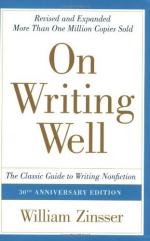
|
| Name: _________________________ | Period: ___________________ |
This test consists of 15 multiple choice questions and 5 short answer questions.
Multiple Choice Questions
1. What approach to a place should writers take?
(a) Just writing ambiguously.
(b) Reading other travel pieces and compare them.
(c) To go within a place and see how it impacts the writer.
(d) To go around asking the locals questions.
2. Does ZInsser give in to his editor's changes?
(a) No. He tends to fight them constantly.
(b) Yes, they are the editors after all.
(c) No, and he never gives in.
(d) Sometimes, only when they are worth it.
3. What is a general rule for writing about sports?
(a) Being as creative as possible to retain readership.
(b) Writing only about one sports.
(c) Using industry standards instead of creative terms when referencing sports topics.
(d) Overeducating the reader about sports facts.
4. How are writers like painters?
(a) Writing isn't like painting at all. Neither has anything in common with the other.
(b) Painters start with models and then learn to create in they own way. Writers use formulas then find their own voice.
(c) Writers and painters will destory their work if it is not to their expectations.
(d) They both have the freedom of creativity with no rules that bind them.
5. What freedom does he give his students?
(a) The power to decide what to write about, what angle to take, what perspective, and what to cut out.
(b) He doesn't give freedom. He is very demanding of his students.
(c) He doesn't give deadlines, the gives very little guidance, and just lets people write and turn in first drafts.
(d) He lets everyone out early on Fridays.
6. What stops Americans from writing memoirs?
(a) An attitude to please teachers and not readers.
(b) Memoires don't sell well enough.
(c) Editors hate reading memoirs therefore don't pick them up.
(d) People don't like reading memoires.
7. Is there room for opinion when writing a sports article?
(a) Writers should limit commentary and stick to the stats.
(b) Yes. Readers trust sports writers to make sports predictions about their favorite teams.
(c) There is always room for commentary.
(d) Absolutely not.
8. Is sports writing different from any other form of good writing?
(a) No, good writing is good writing.
(b) No, it is just as good as other writing.
(c) Yes, it isn't as comprehensive.
(d) Yes, it isn't as important.
9. What advice does Zinsser give to employees who want to change business writing?
(a) Take their concerns to the board.
(b) Complain to HR.
(c) Write the way they want regardless of what their bosses say.
(d) Keep trying to change it and make it better.
10. What does the process of memoir writing do for a writer?
(a) It forces them to talk to distant relatives they hate.
(b) Nothing but write about everything he or she thinks about daily.
(c) It brings back bad memories that the person tried to forget.
(d) It brings up related memories that were pushed into the subconsious.
11. Where does a writer need to start to get his or her voice discovered?
(a) Sign up for a talent search.
(b) Go to a literary agent and ask how to get their voice out.
(c) Read stories aloud at poetry clubs or book clubs.
(d) A writer needs to emulate other writers and see how they utlilize their voices in their writing.
12. What should writers focus on when writing travel pieces?
(a) Information and substance.
(b) Style and substance.
(c) Style and sentence structure.
(d) Substance and exaggerating adjectives.
13. What is a good way to edit a long story?
(a) Have someone else read it aloud.
(b) Break it into sections to make it more manageable.
(c) Read it backwards.
(d) Take a break and read it with fresh eyes.
14. What was the best advice Zinsser ever received about having opinions in writing?
(a) It was to argue both sides of a story.
(b) To never second guess a story.
(c) To always second guess an argument and make a pro and con list.
(d) Take a stand and stick to it. One should never "go peeing down both legs."
15. What is a requirement for good literary criticism?
(a) Subscribing to arts magazines.
(b) Having a comparitive literature degress.
(c) Frequenting the theatre often.
(d) Knowing the subject that the writer wants to write about.
Short Answer Questions
1. What type of memoirs does Zinsser like reading?
2. What do people need to understand about science?
3. What did he love about the New York Herald?
4. What is the biggest fear that nonfiction writers have?
5. What advice does Zinsser have for all writers?
|
This section contains 877 words (approx. 3 pages at 300 words per page) |

|




